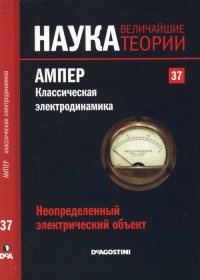Книга Максвелловская научная революция - Ринат Нугаев
Шрифт:
Интервал:
Закладка:
Thomson W., Taite P. (1867) A Treatise on Natural Philosophy. L., Clarendon Press. – 727 p.
Snyder Laura S. (2012) William Whewell. The Stanford Encyclopedia of Philosophy, winter edition.
Thomson W. (1905). On Aether.Proc. Roy. Soc. Edinb., XXV, p. 565.
Watkins John (1984) Science and Scepticism. Princeton University Press. – 406p. Wayne Andrew (2002) Critical Notice. Canadian Journal of Philosophy, vol. 32, № 1, March, pp. 117—138.
Weber W. (1846) Elektrodynamische maasbestimmungen. Uber ein allgemeines Grundgesetz der Elektrischen Wirkung. – In: W. Weber. Werke, Berlin, 1893, Dritten Band, pp. 25 —211.
Whewell William (1847) The Philosophy of Inductive Sciences, founded upon their history, in 2 volumes. Second edition. L., John W. Parker and son. Whewell William (1860) On the Philosophy of Discovery. Chapters Historical and Critical. L., John W. Parker and son. – 403 p.
Whittaker Edmund Taylor (1910). A history of the theories of aether and electricity: from the age of Descartes to the close of the nineteenth century. L., N.Y., Longmans, Green and Co. – 470 p.
Abstract. Maxwellian electrodynamics genesis is considered in the light of the author’s theory change model previously tried on the Copernican and the Einstein revolutions. It is shown that in the case considered a genuine new theory is constructed as a result of the old pre-maxwellian programmes reconciliation: the electrodynamics of AmpereWeber, the wave theory of Fresnel and Young and Faraday’s programme. The «neutral language» constructed for the comparison of the consequences of the theories from these programmes consisted in the language of hydrodynamics with its rich content of analogous models ranging from the uncompressible fluid up to molecular vortices. The programmes’ meeting led to construction of the whole hierarchy of crossbred objects beginning from the displacement current and up to common hybrids. After that the interpenetration of the pre-maxwellian programmes began that marked the beginning of theoretical schemes of optics and electromagnetism unification. Maxwell’s programme did assimilate some ideas of the Ampere-Weber programme, as well as the presuppositions of the programmes of Fresnel and Faraday; and the significance of this fact for further methodology of scientific research programmes development is discussed.
It is argued that the core of Maxwell’s unification strategy was formed by Kantian epistemology looked through the prism of William Whewell and such representatives of Scottish Enlightenment as Thomas Reid and William Hamilton. All these enabled Maxwell to start to unify not only optics and electromagnetism, but British and continental research traditions as well. Maxwell’s programme did supersede the Ampere-Weber one because Maxwell did put forward as a synthetic principle the idea, that differed from that of Ampere-Weber by its flexible and contraontological, strictly epistemological, Kantian character. For Maxwell, ether was not the last building block of physical reality, from which fields and charges should be constructed. «Action at a distance», «incompressible fluid», «molecular vortices» were only models for Maxwell, capable only to direct the researcher on the «right» mathematical relations. From the «representational» point of view all this hydrodynamical models were doomed to failure efforts to describe what can not be described in principle – things in themselves, the «nature» of electrical and magnetic phenomena. On the contrary, Maxwell aimed his programme to find empirically meaningful mathematical relations between the electrodynamics basic objects, i.e. the creation of inter – coordinated electromagnetic field equations system.
Namely the application of this epistemology enabled Hermann von Helmholtz and his pupil Heinrich Hertz to arrive at such a version of Maxwell’s theory that served a heuristical basis for the radiowaves discovery.

























